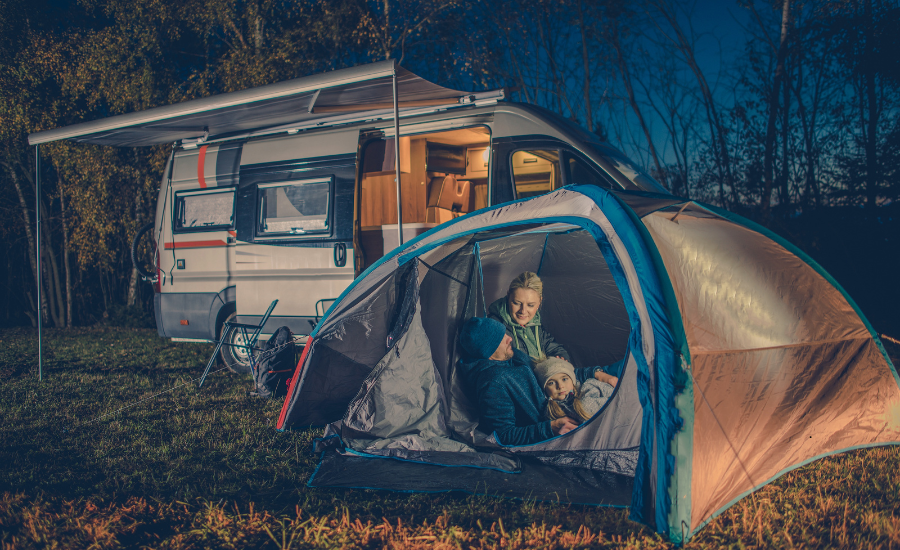Life on the road offers a liberating blend of adventure, independence and spontaneous fun. The allure of waking up to a new horizon every day and the freedom to call any place home is intoxicating. Yet, this nomadic lifestyle comes with unique challenges.
When your vehicle is your home, your safety and security take on a whole new level of importance. Whether you’re parked at a scenic overlook, boondocking in a remote spot, or navigating busy highways, keeping yourself and your mobile abode secure is paramount.
Of course I would much rather focus purely on the joys of RV/van life, but I can’t ignore the practical and essential tips to make your RV or van life as safe as it is enjoyable.
Once you have a worry-free setup, it will be much easier to focus on the wonders of the road. This helpful guide should offer some balance to put you in the right mindset for your travel adventures.
Understanding the Unique Safety Challenges of RV and Van Life
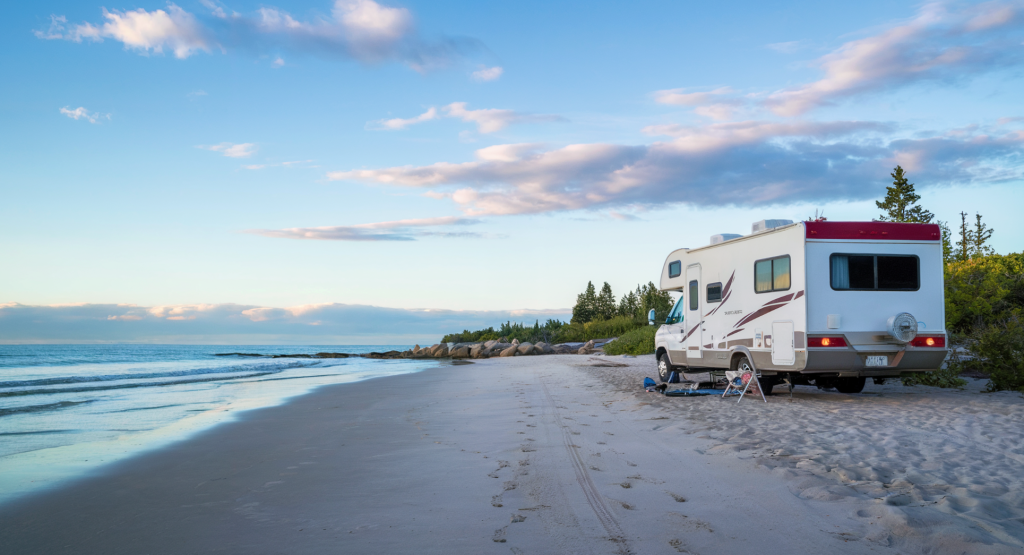
RV and van life offers a sense of spontaneity that traditional living simply can’t match. You have the flexibility to explore national parks, hidden beaches, and quiet mountain trails. However, this very appeal also brings certain risks.
When you’re constantly on the move, you’re exposed to unfamiliar environments, and your vehicle becomes both your home and your most valuable possession. With no fixed address, you might encounter everything from isolated areas with weak cell signals to bustling urban centers where theft is a greater concern.
It’s a lifestyle that requires you to be both adventurous and vigilant.
Common Safety Concerns: Theft, Accidents, and Natural Hazards
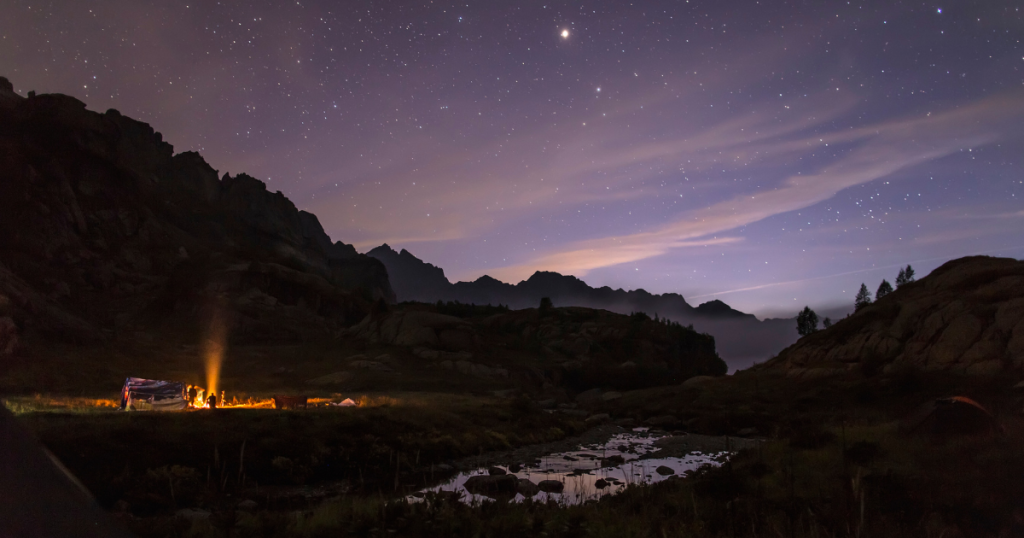
Your RV or van isn’t just a vehicle; it’s a tiny house on wheels filled with your belongings. This makes it a target for opportunistic theft, especially in poorly lit or unsecured areas.
Beyond theft, accidents are another major safety concern, particularly given the size and weight of RVs. Navigating narrow roads, steep inclines, and sudden stops requires a heightened level of awareness. It’s always a good idea to keep a defensive driving posture, especially in a vehicle that is slower to maneuver.
Natural hazards like flash floods, wildfires, and unexpected storms can also put your safety at risk, especially if you’re parked in a vulnerable area.
The more rustic, remote and off-grid camping you intend to do, the greater risk to your security. Being aware of these dangers is the first step toward mitigating them.
Protecting Your Home on Wheels with Essential Security Measures
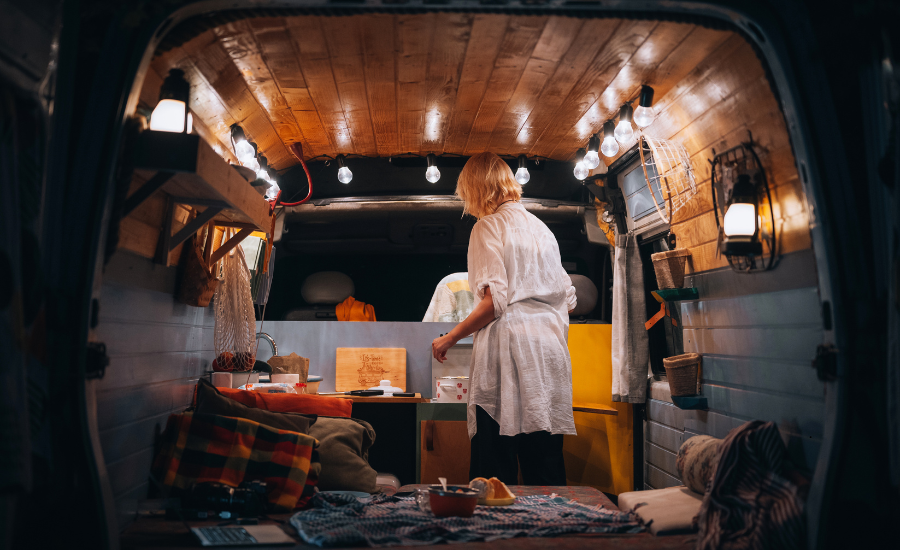
Start with the basics. Blackout curtains are a simple way to make it impossible for someone to get a quick glance at the layout of your RV or van.
High-quality locks then become your first line of strong defense against break-ins. Consider upgrading to deadbolt combination keyless entry locks or installing additional latch locks on doors and windows. Portable door alarms can offer an extra layer of security, alerting you if someone tries to force entry.
Don’t forget about securing exterior compartments where tools or gear are stored—these can be easy targets for thieves.
Having a solar-powered alarm system within a reasonable radius of your rig can deter potential thieves and alert you to unauthorized access. Look for models with motion sensors and smartphone connectivity like the one seen below.
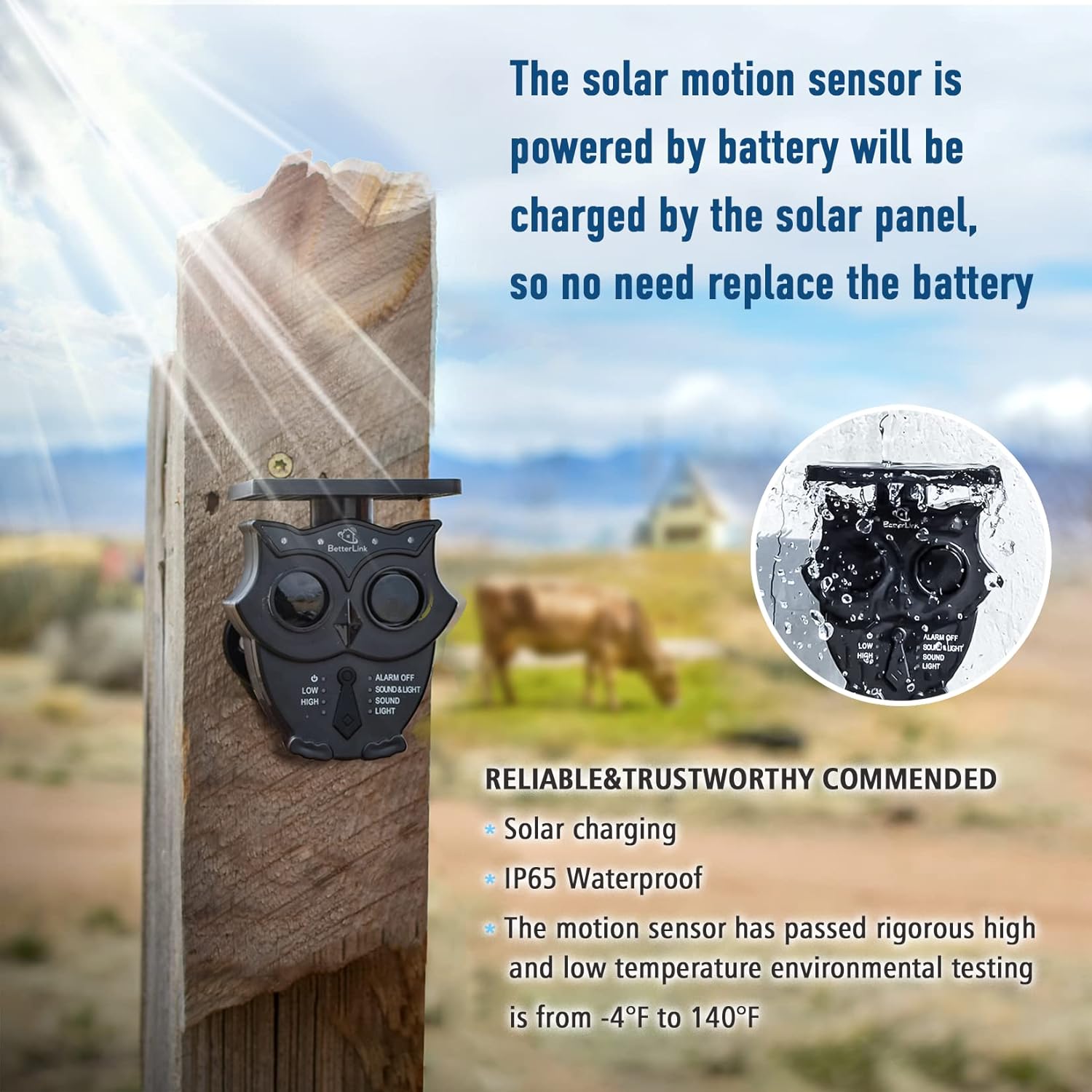
It can be installed on walls, fence posts, trees, or any other surface, providing a 24-hour heat and motion detector for your protection
For added peace of mind, equip your vehicle with a GPS tracker. These devices allow you to monitor your van’s location in real-time, making it easier to recover if stolen. Some trackers even offer geo-fencing alerts, notifying you if your vehicle leaves a designated area.
We also can’t forget that we might be way out in the wilderness, where animals of all types might choose to visit us at inopportune times. It’s good to have a diverse set of self-defense gadgets for your RV or van that can handle a variety of threats. Here is an excellent checklist from a seasoned solo traveler to get you started:
And speaking of animals: built-in security is an added bonus for those who are RV living with pets!
Lastly, invest in a good travel safe that is large enough to store your money, important documents, digital gadgets and laptop.
Parking Smart: Choosing Safe Overnight Spots and Campsites
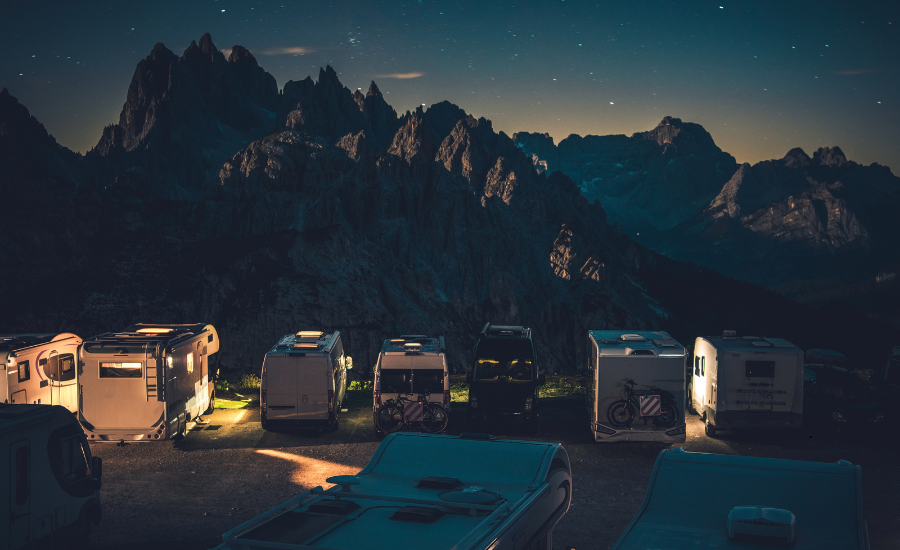
Where you park matters—a lot. Opt for well-lit, populated areas when staying overnight. If you’re boondocking, look for spots with good visibility and a clear exit route in case you need to leave quickly.
Apps like iOverlander and Campendium can help you find reputable, secure locations shared by fellow travelers. Be sure to let the most trusted members of your van life community know your whereabouts and travel plans at all times.
Above all: trust your instincts! if a place doesn’t feel safe, it’s better to move on.
Personal Safety on the Road: Staying Vigilant and Prepared

As noted above, listening to your gut is one of the most reliable safety tools you have and is worth a bit more exploration … and a personal story.
If a person or situation seems off, don’t hesitate to leave, even if your travel companions think you might be over-reacting. I recall one instance traveling to Antigua, Guatemala with my family and going out for a day hike away from the tourist police in the town center.
As we approached a more remote area with very few houses, and certainly no police, I noticed a group of six men who were loitering nowhere near any store, bus stop or other location that made sense to me.
They didn’t seem to be going anywhere, and immediately stopped talking as we got closer. I waved in a friendly manner, said hello in Spanish, and no one returned the greeting. Needless to say, I directed my family quickly back the way we came despite their protests that I was being paranoid.
My family thought the group might just be heading to a farm or property for day work. I asked, “Did you see them carrying anything that looked like work equipment, any bags? Or did they just have their hands in their pockets with angry looks? — that’s what I saw. There are plenty of other places we can go.”
That situation might not have been planned, but it certainly looked like the possibility for an opportunistic robbery or worse. If you are a nomad, these types of encounters will become much more frequent, so a healthy dose of paranoia is highly recommended.
Safety Apps You Need: Tools for Emergencies and Navigation

Your smartphone and laptop are more than communication devices—they are a vital part of your safety arsenal. Download apps like Roadtrippers and Google Maps for navigation, and consider emergency apps like SOS Alert and what3words for precise location sharing in emergencies.
Keep a list of emergency contacts and local authorities saved in your phone for quick access.
Stay informed with apps like GasBuddy for fuel stops, OnStar for vehicle assistance, and Waze for traffic updates. These tools can help you avoid unsafe areas and find the best routes during your travels.
Digital Security: Protecting Your Information on the Go
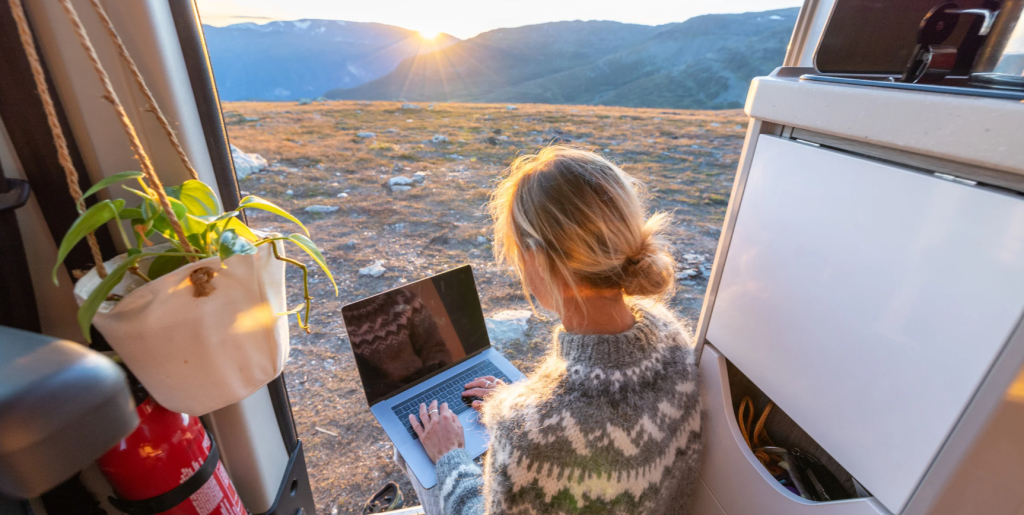
Speaking of technology: our digital devices are convenient, and free Wi-Fi certainly can be tempting, but public networks are hotspots for hackers. Avoid accessing sensitive information, like banking apps, on unsecured Wi-Fi. Invest in a portable Wi-Fi router or use a VPN (Virtual Private Network) to encrypt your online activity. This extra step will keep your personal data safe from prying eyes.
It’s always great advice to diversify your payment methods; cash is the best, but be careful keeping amounts that would be crippling if lost or stolen. Notify your credit/debit card banks of your travel plans so that you are not inadvertently flagged for suspicious activity, but also to ensure that legitimate theft can be recovered. Keep an eye on your bank statements for any unusual transactions, and report any discrepancies immediately.
Avoid sharing your current location publicly, especially on social media. While it’s fun to post photos in real-time, consider waiting until you’ve left a location before sharing where you were.
Emergency Preparedness: Planning for the Unexpected
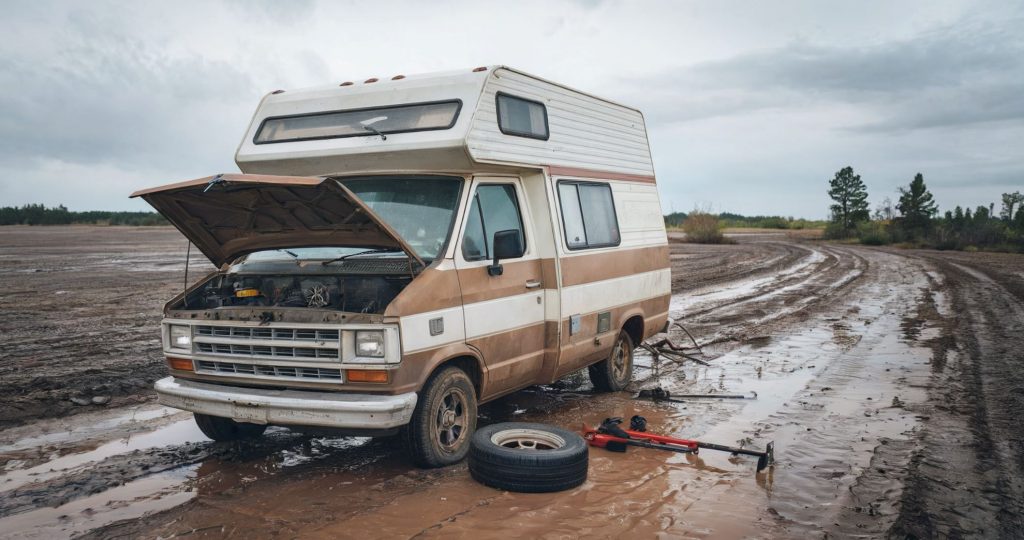
A well-stocked roadside emergency kit can be a lifesaver. Include essentials like a tire repair kit, jumper cables, a flashlight, reflective warning triangles, and a multi-tool. Don’t forget basic medical supplies for your first aid kit like bandages, antiseptics, and pain relievers. Keep your kit in an easily accessible spot.
Accidents can happen, even in the safest environments. Learn basic wilderness first aid skills and keep a manual handy for quick reference.
Mother Nature can be unpredictable. Stay informed about local weather conditions, especially when camping in areas prone to wildfires, flash floods, or severe storms. Download weather apps like National Weather Service Radar and set alerts for severe weather warnings. Have an evacuation plan in place and know the fastest route out of your location.
Trustworthy Resources and Communities for Staying Informed
In addition to my article above as a starting point, joining online forums like Facebook groups and Reddit communities dedicated to RV and van life can connect you with seasoned travelers who share safety advice and personal stories.
These communities are helpful for getting real-time updates on road conditions, campsite safety, and regional alerts. But they are also great resources for where to find RV and van gear, trade or barter items and skills, etc.
Keep learning from trusted sources. Blogs like ours 😉and podcasts such as “RV Miles” regularly cover safety tips and updates. Staying informed is the best way to ensure your journey is not only thrilling but also secure.
Now you can go and enjoy your adventures with confidence, knowing you’ve got the tools and knowledge to keep yourself and your mobile home safe.
Happy travels, and stay secure on the open road!
See Our Latest Posts
- 21 Fun Camping Games to Entertain Yourself Outdoors
- How to Set Up a Hammock for Camping
- Compact Camping Gear That Saves Space in Your RV or Van
- Top 15 Most Beautiful Waterfalls In The World To Visit In Your Lifetime
- Top 12 Camping Gadgets and Accessories You Didn’t Know You Needed (2025)
Write A Guest Post For Us!
Are you passionate about camping and the great outdoors?
We’re excited to announce that we’re accepting guest posts
in the camping and outdoor niche!

